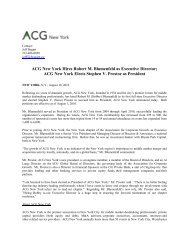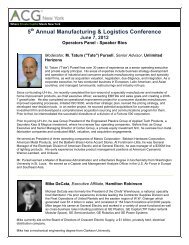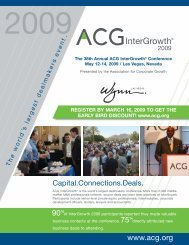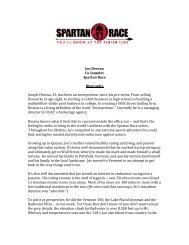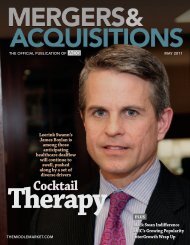Not one to mince words, KPS Capital's Michael Psaros offers a ...
Not one to mince words, KPS Capital's Michael Psaros offers a ...
Not one to mince words, KPS Capital's Michael Psaros offers a ...
- No tags were found...
You also want an ePaper? Increase the reach of your titles
YUMPU automatically turns print PDFs into web optimized ePapers that Google loves.
20-35_Roundup.qxd 4/6/09 5:39 PM Page 20Round UpActivists AdaptThe depressed M&A market has made life harder onactivist inves<strong>to</strong>rs, though many are re<strong>to</strong>oling theirplaybook in order <strong>to</strong> stay busyBy Avram Davis“I don’t see alot of sabrerattlers rightnow tellingmanagementteams that theyhave all theanswers.”For the past five years, the playbook of activistinves<strong>to</strong>rs might resemble the old “straight T” offenseemployed by the Oklahoma So<strong>one</strong>rs footballteam in the Fifties; its brilliance was in its simplicity.Inves<strong>to</strong>rs could quietly build up a stake in abusiness, and then a few months later go public withthe notion that the targeted company should seek asale. It was almost <strong>to</strong>o easy, although without credit,such a strategy has nearly been rendered obsolete.That doesn’t necessarily mean that activism is dead.Take the recent 13D filing from Trian Fund Management,which went public with its 7% stake in Dr. PepperSnapple Group in December. Nowhere in its filingdid Trian mention a possible sale. Rather, the activist’sblueprint revolved around a stimulating a “sharper strategicfocus, better operational execution and more efficientuses of capital.” A divestiture of the Dr. Pepperbottling operations could be a part of the plan, thoughthe strategy does not appear <strong>to</strong> be as reliant on M&A,or more specifically an auction for the entire company,as past endeavors from activists. Trian, it should be noted,has his<strong>to</strong>rically used a blueprint focused on execution.In many cases <strong>to</strong>day, activists will keep the optionfor a sale open, but at the same time they seem <strong>to</strong> acknowledgethat a deal offering a premium <strong>to</strong> shareprice is no sure thing. When Simcoe Capital and JeffreyJacobowitz built up a stake in Telular, the inves<strong>to</strong>rspushed for the company <strong>to</strong> use its strong cash position<strong>to</strong> either “aggressively repurchase shares and <strong>to</strong>consider paying an ongoing cash dividend” and alsocauti<strong>one</strong>d Telular management <strong>to</strong> adopt an “extremelycautious approach <strong>to</strong> acquisition activity.”In its letter, Simcoe also floated the possibility ofstrategic alternatives but added the caveat that only“under the right circumstances, at the right time andfor the right price,” would such a strategy work. Simcoealso added that its nominees for the Telular boardhave “no current plan or proposal” <strong>to</strong> pursue a sale.The state of the credit markets has quite obviouslymade activism more difficult, and with the economynow in a recession, even operational fixes can be<strong>to</strong>ugh. Most companies are already doing what theycan <strong>to</strong> trim costs, and excess cash on the balance sheet,most recognize, is no longer a low-hanging fruit foractivists, as this cash provides a much needed cushionin light of the illiquid environment.“I don’t see a lot of sabre rattlers right now tellingmanagement teams that they have all the answers,”says Keybanc Capital Markets managing direc<strong>to</strong>r LelandHarrs, who works in the firm’s chemicals group.“If they did, I think those suggestions would probablybe welcomed,” he adds.Of course, many activists are essentially stuck witha position in a company after having missed its windowfor a possible sale. These groups are unlikely <strong>to</strong> justunload their positions and swallow a loss. Instead,many inves<strong>to</strong>rs will simply re<strong>to</strong>ol their approach.“I have a hard time seeing [activists] quietly goingaway, and not worrying about the large holding thatthey may have in a company,” says Harris Williams& Co. managing direc<strong>to</strong>r Tiff Armstrong, who notesthat at the same time he doesn’t expect these inves<strong>to</strong>rs<strong>to</strong> be in a position where they can “advocate a sale.”Sandell Asset Management has been a stakeholderin Southern Union since 2006, an investment thatrepresents roughly a quarter of the firm’s domestic portfolio.Three years ago, the plan was for Southern Union<strong>to</strong> either sell the company or convert <strong>to</strong> a master limitedpartnership. Today, though, the firm has <strong>to</strong> anglefor corporate governance and operational changes. Itis perhaps a more modest goal, but it allows the inves<strong>to</strong>rs<strong>to</strong> maintain an activist posture with objectivesthat are still attainable.Of course, modesty isn’t the first thing people thinkwhen it comes <strong>to</strong> activism. And for some inves<strong>to</strong>rs, thecredit crunch has opened the door for a more contentiousoption than even a sale would present. “I’ve gotmy hands full of liquidations,” says Kenneth Yager,II, a principal at advisory firm Morris-Anderson &Associates. “Every company that I’m dealing with nowseems <strong>to</strong> be moving in that direction.”20 MERGERS & ACQUISITIONS February 2009



